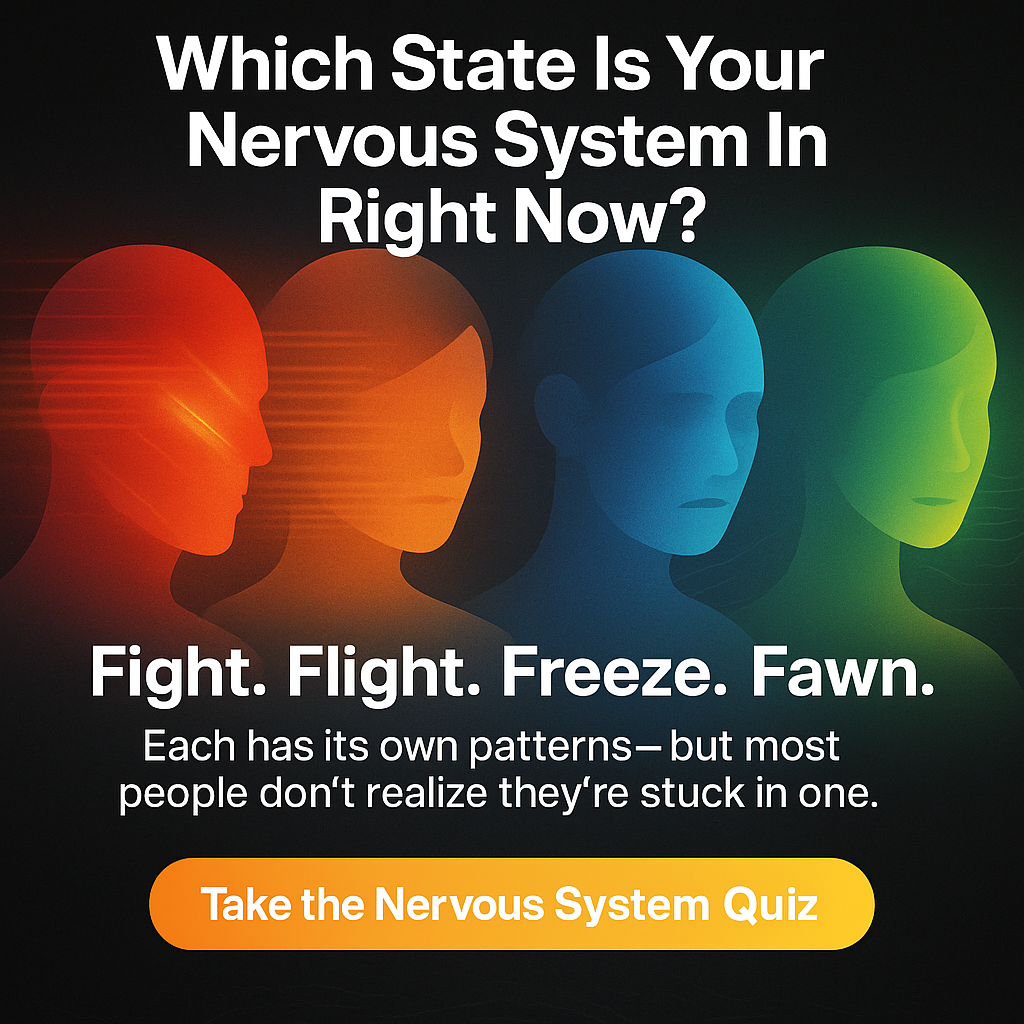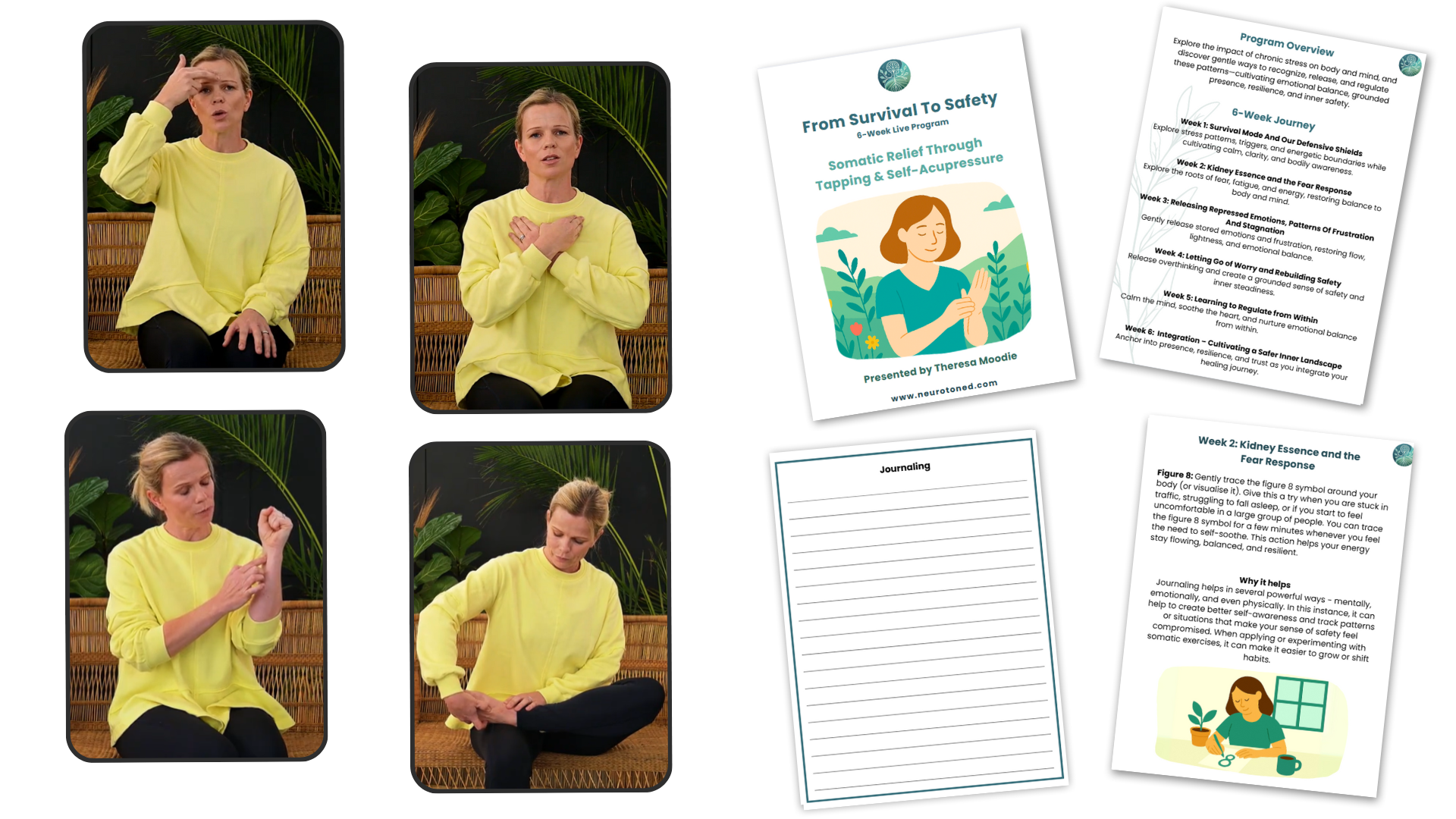
Reconnecting With Hunger And Fullness After Chronic Stress
When life has been overwhelming for a long time, your body often copes by going quiet. You may not notice hunger until you feel shaky. Fullness may arrive too suddenly. You might forget to eat, or eat quickly to soothe a tense system. None of this means you’re broken. It means your nervous system has been working overtime to protect you.
If you’re unsure which stress patterns might be pulling you out of your body, you can take the Stress Loop Quiz anytime.
A quick, steady answer
Chronic stress disrupts hunger and fullness because the body shifts into survival mode. Digestion slows or speeds unpredictably, appetite signals get scrambled, and interoception (your ability to sense inside your body) becomes harder to access. Reconnecting happens through small pockets of safety, gentle pauses, and slow sensory awareness. Many people notice their cues returning as their nervous system softens, breath steadies, and food becomes a quieter experience again.
Why Chronic Stress Alters Hunger And Fullness
When your body has spent months or years in a protective state, it’s common to feel like you’re living slightly outside yourself. Some describe it as being “ready to jump out of my skin for no reason.” If that resonates, this piece may help you understand the physiology behind that feeling.
In a stress response, the brain redirects energy away from digestion and into survival. Hormones shift. Blood flow changes. Stomach sensations become harder to interpret. You might feel no appetite at all or sudden waves of intense hunger. Panic can blend with hunger sensations, and many people confuse the two. For more clarity on how panic interacts with the body, this guide on panic attacks can help.
For others, stomach tension, nausea, or butterflies blur into emotional distress. If this has happened to you, here’s a gentle explanation of that gut-body connection.
Some people stop noticing hunger cues because their body goes numb under stress. If numbness is familiar, this guide explains why it happens and offers gentle ways back into your body.
None of these patterns mean you’re doing anything wrong. They’re adaptations. And adaptations can soften.
You may read The Gut-Brain Connection and Trauma, Simply Explained for more information.
A Gentle Sequence To Try Before Eating
Try this before your next meal. Pause if anything feels too much.
1. Allow yourself to arrive
Sit down, place both feet on the ground, and exhale with a little more length. Even two or three breaths can signal safety.
2. Orient to something calming
Look around your space and name three colors you see. This helps quiet the survival response and bring you into the present moment. You can read through a gentle guide in Orienting Practice: A Gentle Way to Calm Your Nervous System.
3. Ask softly, “How hungry am I right now?”
You don’t need a number. You only need a sense.
4. Notice early cues
Hunger may show up as warmth in the chest, a softer jaw, a small lift in energy, or a hollow feeling in the belly. Fullness may show up as slower chewing, a long exhale, or less interest in the next bite.
5. Eat in waves instead of all at once
Take two or three bites, pause for one breath, and check in. No pressure to feel anything, just noticing.
6. Respond to yourself with kindness
Your cues aren’t gone. They’re quiet. They return through safety, not force. If sensations feel confusing or uncomfortable, this piece explains the overlap between emotional and physical discomfort.
What Hunger May Feel Like After Long Stress
Hunger may not feel like a stomach growl. It may feel like:
- A drop in patience
- Difficulty focusing
- Light warmth in the abdomen
- A small rise in energy
- Jaw softening
Your job isn’t to get it perfect. It’s to notice the faint signals that were drowned out by stress.
If you’re learning how to rebuild trust with your body, a trauma-informed lens may help.
What Fullness May Feel Like
Fullness doesn’t always mean “I’m stuffed.” It often starts quietly:
- Chewing slows
- A deeper breath appears
- Interest in food softens
- A tiny sense of pause shows up
If fullness feels too intense, shorten the check-ins. One breath is enough.
If You Feel Wired While Eating
A wired system might:
- Rush through meals
- Tighten the jaw
- Lose breath rhythm
- Feel on edge instead of present
Try:
- One slow exhale before each set of bites
- Eating with back support
- Starting with warm foods
- Letting your shoulders drop intentionally
If deep breathing spikes anxiety, check out Why Deep Breathing Makes Me More Anxious, And What To Do Instead for alternatives.
If You Feel Numb While Eating
Numbness is protective. You can gently reconnect by trying:
- A warm sip of tea
- Feeling the texture of the table
- Noticing temperature (warm, cool, neutral)
- Choosing foods with gentle flavor contrast
A 7-Day Reconnection Plan
Small steps build trust.
Day 1: Place both feet on the ground and take three slower exhales before one meal.
Day 2: Name three colors in the room.
Day 3: Notice one early hunger cue.
Day 4: Eat in short waves: two bites, then one breath.
Day 5: Notice one early fullness cue.
Day 6: Drink something warm before eating.
Day 7: Write down one thing your body communicated this week.
You can take the Stress Loop Quiz anytime to understand your patterns more clearly.
Common Sticking Points
“I still can’t feel anything.”
Completely normal. Sensations return slowly.
“I get overwhelmed when I pause.”
Shorten the pause. Even one second counts.
“My cues feel unreliable.”
Bodies heal in layers. If you relate to feeling unworthy or disconnected from yourself, this reflection in “I’m Not Worthy To Be Someone’s Friend Because I Don’t Have A Self” may resonate.
“I eat past fullness before I realize.”
Try checking in earlier and more often.
FAQs
1. Why does chronic stress mute hunger and fullness?
Survival modes shift attention away from digestion. Signals become faint.
2. How long until cues return?
It varies. Many people notice small changes within weeks.
3. Why do I feel emotional when I slow down to eat?
Safety brings feelings to the surface. This is normal.
4. Should I track calories during this process?
Most people find numbers distract from internal signals. You can ask a professional if unsure.
5. What if fullness triggers anxiety?
Eat more slowly, add grounding, or try warm foods first.
6. Can these steps help with binge or restrict cycles?
They may help soften extremes, but this is educational only. Seek professional support when needed.
More Gentle Reads
- How to Eat to Feel Safe: Nervous System-Friendly Meals
- Hydration Habits For Steadier Nerves
- How to Feel Your Body Again After Numbness
Disclaimer: This article is educational and not medical advice. If you have health concerns, consider speaking with a qualified professional
Discover Your Vagal Tone
Find out how dysregulated your nervous system is and get your personalized roadmap to feeling calm, energized, and in control


